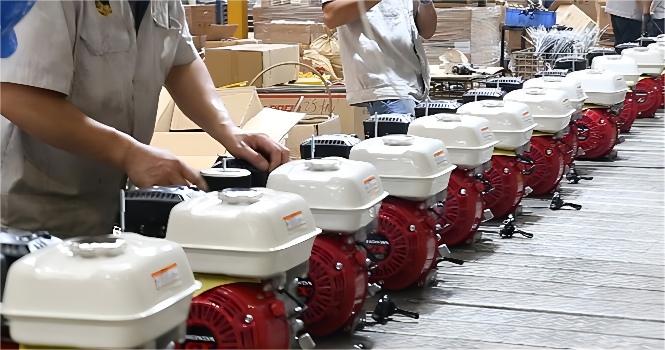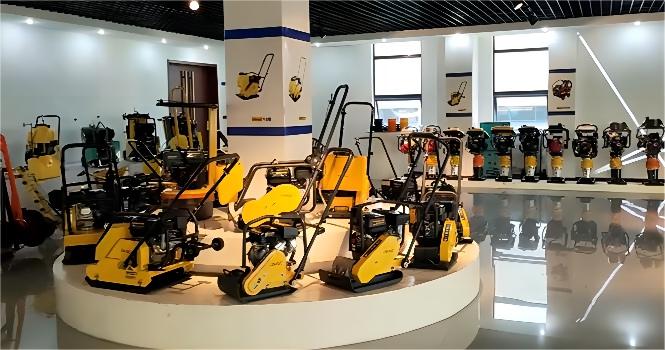Rouleau de chantier PME-R3000
When you are looking for a construction road roller, we can assist you in selecting the most suitable rouleau compacteur pour votre entreprise.
Rouleau de chantier PME-R3000
The PME-R3000 Construction Rouleau de route is a high-performance machine engineered for large-scale roadwork, soil compaction, and infrastructure development. With dual 710 mm diameter rollers and a 1200 mm width, this roller is designed for maximum efficiency and precision in heavy-duty compaction tasks. Its robust features and powerful performance make it the ideal choice for large construction projects requiring reliable and deep compaction.
De puissantes performances
Equipped with the reliable ChangChai ZN390B engine, the PME-R3000 delivers exceptional power and consistent performance, ensuring smooth operation on demanding construction sites. Its hydraulic double-wheels drive system guarantees smooth movement and reliable traction, while the hydraulic double-wheel vibration system provides a centrifugal force of 35 KN at a vibration frequency of 75 Hz. The nominal amplitude of 0.5 mm allows for effective and uniform compaction across various materials, including asphalt, gravel, and soil, ensuring stable and durable surfaces.
Application polyvalente
The PME-R3000 is designed to tackle a wide range of compaction tasks. From road construction to large-scale foundation preparation and soil stabilization, this roller delivers precision and efficiency in every pass. The hydraulic steering system offers a wide turning radius of 3000 mm, allowing for excellent maneuverability in both open and confined spaces. Its gradeability of 30° ensures reliable performance even on steep slopes or uneven terrains. With a travel speed range of 0-12 km/h, the PME-R3000 covers large job sites quickly while maintaining control and precision.
Construit pour durer
The PME-R3000 is built for durability and longevity. Constructed with high-quality materials, it is designed to withstand the harsh demands of large construction projects. Its advanced hydraulic systems ensure smooth, uninterrupted operation, reducing maintenance requirements and maximizing uptime. Whether used for compacting subgrades, stabilizing soil, or preparing large foundations, the PME-R3000 is engineered to deliver reliable results and withstand the rigors of continuous use.
Applications
- Construction et entretien des routes
- Asphalt, Gravel, and Soil Compaction
- Projets d'infrastructure à grande échelle
- Foundation and Subgrade Preparation
- Soil Stabilization
- Compaction on Slopes and Uneven Terrain (Gradeability: 30°)
- Driveways, Pathways, and Landscaping
- High-Efficiency Compaction for Large Job Sites
With its powerful engine, advanced hydraulic systems, and superior compaction capabilities, the PME-R3000 Construction Road Roller is a top choice for contractors and professionals who require a reliable and efficient compaction solution for large-scale construction tasks. Its durable construction, precise performance, and user-friendly operation make it an invaluable asset for any heavy-duty construction project.
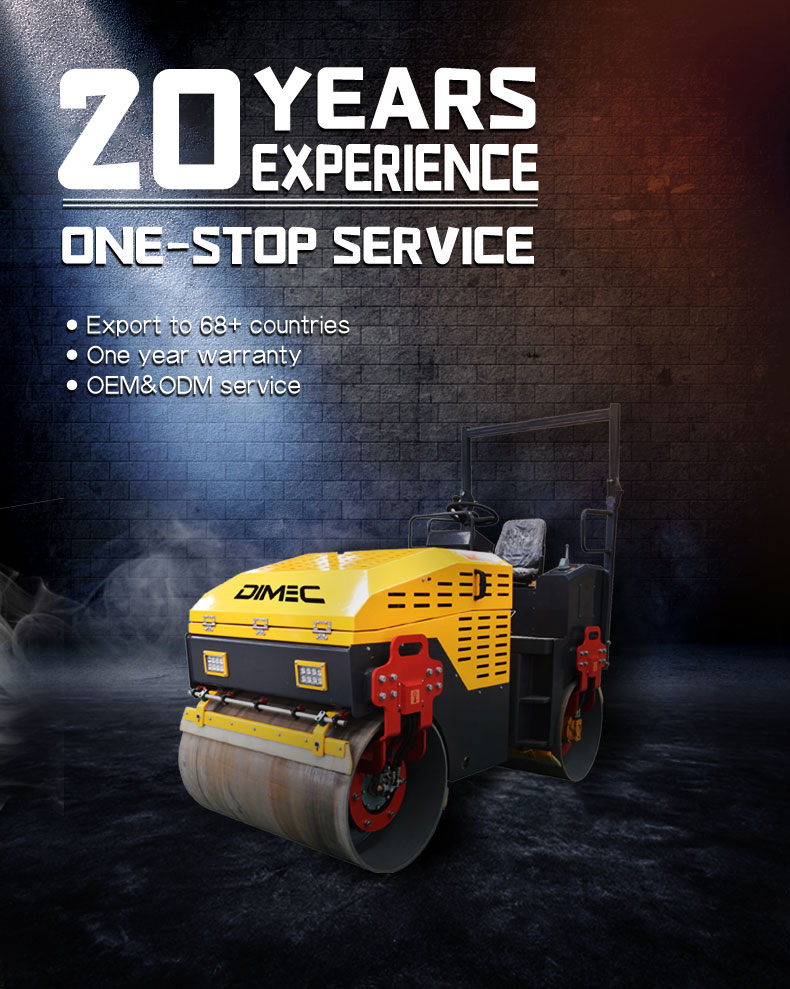


Principales spécifications
| Modèle | Rouleau de chantier PME-R3000 |
|---|---|
| Moteur | ChangChai ZN390B |
| Roller size [diameter x width] | 2xφ710x1200 mm |
| Drive type | Hydraulic double wheels drive |
| Vibration type | Hydraulic douuble wheel vibration |
| Steering mode | Hydraulic control |
| Steering radius | 3000 mm |
| Nominal amplitude | 0.5 mm |
| Fréquence de vibration | 75 Hz |
| Centrifugal force | 35 KN |
| Gradeability | 30° |
| Travel speed | 0-12 km/h |
| N.W./G.W. | 3150/3200 kg |
| Taille de l'emballage | 280x130x215 cm |
AVANTAGE

Exquisite Workmanship
The hood of the road roller showcases excellent craftsmanship. The bright yellow paint is flawlessly applied, providing a smooth and vibrant finish.
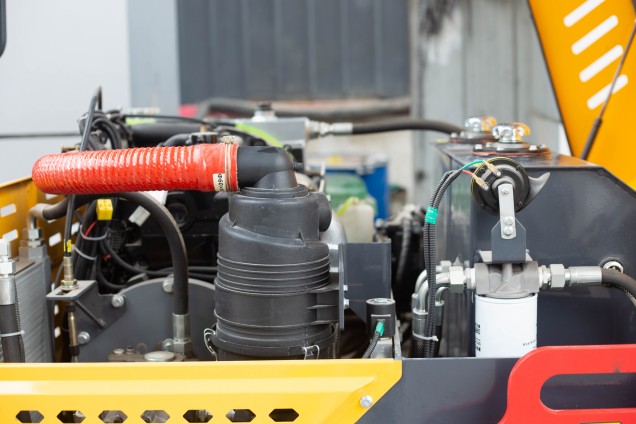
Efficient Engine Compartment Organization
The engine compartment is organized with components such as hoses, filters, and the engine block properly placed.This organized layout facilitates maintenance and ensures the smooth operation of the road roller's engine.
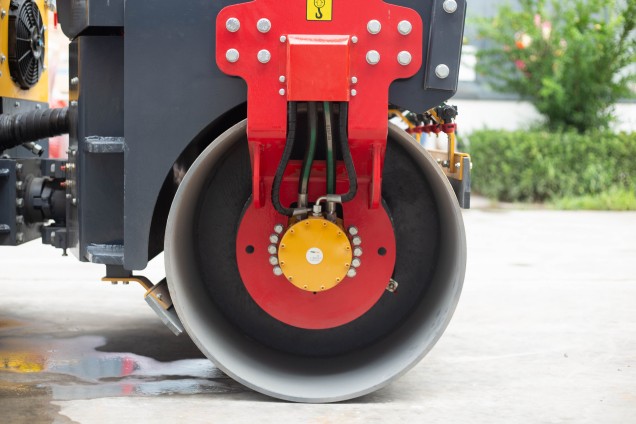
Large Compaction Drum
The roller features a large compaction drum at the front. This drum is responsible for compacting soil, asphalt, and other construction materials. The large size of the drum ensures a smooth and even compaction surface.
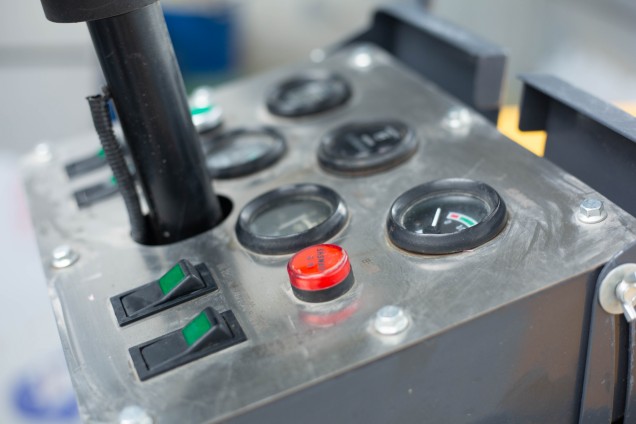
Intuitive Control Panel Layout
The control panel features a well - arranged layout with clearly marked buttons and gauges. This design allows for easy access and operation, reducing the likelihood of errors and improving the efficiency of the road roller's functions.
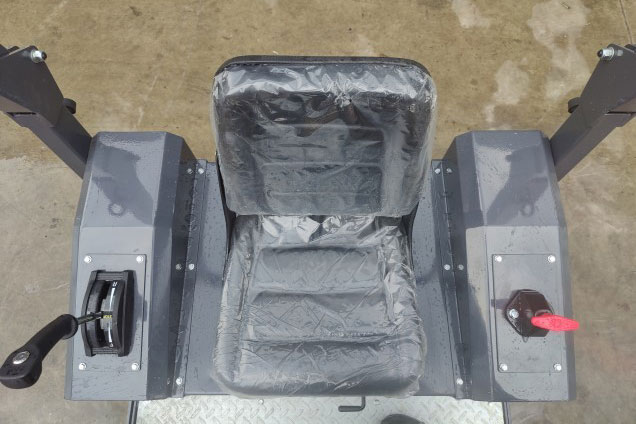
Comfortable Seat
The roller is equipped with a cushioned seat, providing comfort for the operator during extended use. It is flanked by handlebars, providing a secure and comfortable operating position for the operator, which enhances the overall usability of the road roller.
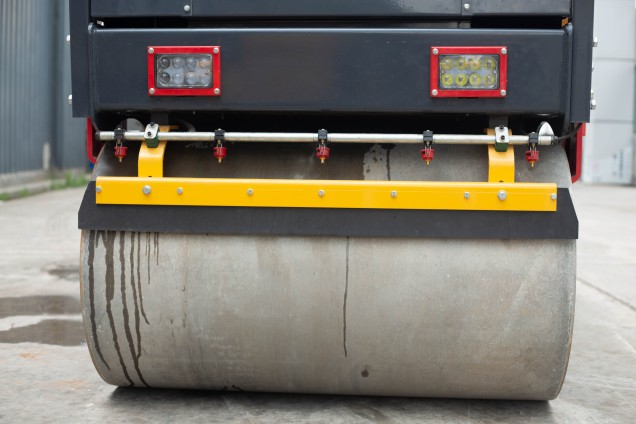
Drum with Scraper
The roller is equipped with a drum that has a built - in scraper. The scraper helps to remove any material that may stick to the drum during the compaction process, ensuring that the drum remains clean and effective. This feature is crucial for maintaining the quality of the compaction work.
QUESTIONS ET RÉPONSES
The primary function of a construction road roller is to compact materials such as soil, gravel, and asphalt during construction projects to create a smooth and stable surface.
The main types of road rollers include vibratory rollers, static rollers, and pneumatic rollers, each designed for different compaction needs.
Vibratory rollers use vibrations for compaction, while pneumatic rollers use rubber tires to apply pressure.
A vibratory road roller uses vibrations generated by the machine’s drums to compact materials more effectively, making it ideal for granular materials like sand or gravel.
Factors such as soil type, moisture content, roller weight, speed, and vibration frequency all play a role in determining the efficiency of the compaction process.
Regular maintenance includes checking the engine, hydraulic systems, and tires, as well as performing routine oil changes, filter replacements, and inspecting the vibratory mechanism.
Common issues include engine problems, overheating, and malfunctioning vibratory systems, all of which can often be resolved with proper maintenance and timely repairs.
Yes, pneumatic rollers are particularly suited for uneven terrains.
Renting is usually the better option for short-term or smaller projects.
Operators should wear helmets, high-visibility vests, and ear protection.
Autres produits similaires
Scie à béton PME-Q400
Scie à béton PME-Q350
Scie routière PME-Q300
Rouleau Vibro Ride On PME-R6000
Rouleau compacteur routier PME-R3500
Rouleau de chantier PME-R3000
Plus de 20 ans d'expérience
Fabricant de machines de construction
Fabricant professionnel de petites machines de construction, ses principaux produits sont les suivants compacteur à plaque, pilon de bourragerouleau compresseur, scie à sol, vibrateur de béton, générateur, etc.
Construction Road Roller
Construction road rollers are an indispensable tool in modern infrastructure projects. From road construction to landscaping, these machines ensure that surfaces are compacted properly, offering a smooth and durable result. Whether you are choosing a road roller for your next project or maintaining one you already own, understanding the key features, types, and maintenance requirements is essential for maximizing their effectiveness.

Construction Road Roller: A Complete Guide to Types, Uses, and Benefits
Introduction to Construction Road Rollers
When you think of large-scale construction projects—whether it’s road building, infrastructure work, or even heavy landscaping—the construction road roller is likely to be a key player. But what exactly is a road roller, and why is it indispensable on the job site?
A construction road roller is a powerful machine used to compact soil, asphalt, and other materials to create a solid and stable surface. These machines are critical for ensuring the durability of roads and other surfaces that must withstand heavy traffic and weather conditions. Whether it’s flattening the ground for a new road or compacting layers of asphalt, road rollers ensure that the foundation is strong and level.
Why Road Rollers are Essential for Construction Projects
Road rollers help in increasing the density of the material being compacted, which improves its stability and load-bearing capacity. Without them, construction projects would be far more time-consuming, and the quality of the roads or pavements could suffer. Road rollers also reduce the risk of cracks and other structural failures by ensuring even compaction.
Types of Construction Road Rollers
There are several types of construction road rollers, each designed for specific tasks. Let’s explore these different types to understand their functionalities.
Rouleaux vibrants
Vibratory rollers are equipped with a system that produces vibrations during compaction. These vibrations help in breaking up air pockets within the material, achieving higher compaction density. These are commonly used for compacting asphalt and soil in large construction projects.
Rouleaux statiques
Static rollers do not have a vibration system. Instead, they rely on the weight of the drum to compact the surface. They are typically used for less demanding compaction tasks, such as compacting subgrades or softer materials.
Rouleaux tandem
Tandem rollers are equipped with two drums, one in the front and one in the rear. These are used primarily for asphalt compaction and are particularly effective for creating smooth, even surfaces. The dual drum design allows for even distribution of force.
Rouleaux pneumatiques
Pneumatic rollers use a series of rubber tires instead of a solid drum. These tires help distribute the compaction force more evenly across the surface. They are ideal for use on granular soils and for final compaction of asphalt surfaces.
Rouleaux combinés
Combination rollers combine the best features of both vibratory and pneumatic rollers. They feature a vibratory drum in the front and a set of pneumatic tires in the back, making them versatile for use on both granular and asphalt surfaces.
Key Components of a Construction Road Roller
Understanding the key components of a road roller can give you a better idea of how it functions. Here are the main parts:
Drum
The drum is the most critical part of the road roller. It’s the large cylindrical surface that comes into direct contact with the material being compacted. Drums can be either smooth or patterned, depending on the type of compaction needed.
Moteur et système d'alimentation
The engine provides the necessary power for the roller’s movement and operation of the drum. Road rollers usually have diesel engines for maximum power output, although electric models are becoming more popular in eco-conscious markets.
Operator’s Cabin
The operator’s cabin is where the driver controls the machine. Modern rollers have ergonomic cabins with advanced controls and even air-conditioning for comfort during long working hours.
Tires and Traction System
Tires are used on pneumatic and combination rollers. The traction system helps move the roller forward and backward, providing the necessary force for compaction.
Control System
The control system includes the steering, compaction control, and hydraulic systems. Many newer models include digital displays and automated settings for optimal compaction.
How Road Rollers Work
The key to understanding road rollers lies in their compaction process. Here’s how they work:
Compaction Process
Road rollers use weight, vibration, and pressure to compress layers of soil, asphalt, or other materials. The drum rolls over the surface repeatedly to ensure even compaction.
The Role of Vibration and Pressure
In vibratory rollers, the vibrations help the material settle more evenly, while static rollers rely on the pressure from the drum’s weight. Both methods ensure a tight, stable surface that can handle heavy loads.
Achieving Optimal Compaction
To achieve optimal compaction, it’s important to adjust the roller’s speed, vibration settings, and pressure based on the material being compacted and the surface’s condition. A well-compacted surface leads to better durability and less maintenance in the future.
Facteurs affectant le compactage
Several factors influence the effectiveness of compaction when using a construction road roller:
Type de sol : Different soil types require different compaction techniques. Granular soils like sand or gravel are easier to compact than cohesive soils like clay.
Moisture Content: The moisture level of the material plays a crucial role. Too much moisture can cause the material to be too soft, while too little moisture may make it too hard to compact effectively.
Roller Weight and Speed: The weight of the roller determines the amount of pressure applied during compaction. The speed at which the roller moves also affects the quality of compaction—too fast and the material won’t compress properly.
Role of Frequency and Amplitude
In vibratory rollers, the frequency and amplitude of the vibrations are essential for achieving effective compaction. Higher frequency and amplitude can help achieve deeper compaction, especially for granular materials. Operators adjust these settings based on the material being compacted and the depth of the layer.
Uses of Construction Road Rollers
Road rollers are used in a variety of applications, all vital for construction and infrastructure projects.
Road Construction and Repair
One of the most common uses of road rollers is in road construction. From preparing subgrade material to compacting asphalt layers, road rollers play an essential role in ensuring roads are durable and capable of supporting traffic.
Compactage du sol
In large-scale earthworks, road rollers are used to compact soil for foundations, embankments, and dams. This process ensures the soil has the required density to support structures without shifting or settling.
Asphalt Paving
When laying down asphalt, rollers help achieve a smooth, uniform surface. They help bond the asphalt layers together and prevent cracking due to uneven compaction.
Landscaping and Ground Preparation
In landscaping, road rollers are often used to prepare ground surfaces for features like playgrounds, sports fields, and parking lots, ensuring the ground is level and stable.
Benefits of Using Construction Road Rollers
There are several advantages to using road rollers in construction projects:
Efficacité du compactage
Road rollers drastically speed up the compaction process. Their weight and technology allow for quick and consistent results compared to manual methods.
Time-Saving Features
Road rollers can cover large areas quickly, reducing the amount of time required for project completion. The faster you complete compaction, the sooner you can move on to the next phase of construction.
Cost-Effectiveness for Large Projects
Though road rollers are expensive, their efficiency makes them cost-effective in the long run. For large-scale projects, they save both time and labor costs.
Durabilité et longévité
Modern road rollers are built to last, providing years of reliable service when properly maintained.
Facteurs à prendre en compte lors du choix d'un rouleau compresseur
Selecting the right road roller can be a complex decision, influenced by several factors:
Terrain and Surface Type
Different rollers are better suited for different types of terrain. For example, pneumatic rollers are great for granular soils, while vibratory rollers excel in asphalt work.
Load and Compaction Requirements
The load and compaction requirements of your project will determine whether you need a static or rouleau vibrant, or something in between.
Budget and Operational Costs
Consider the initial purchase cost as well as the operational costs, including fuel, maintenance, and repairs.
Efficacité énergétique
Fuel consumption can vary significantly among models. If you’re working on a large project, it’s worth considering fuel efficiency to reduce overall costs.
Common Challenges with Road Rollers
While road rollers are incredibly useful, they come with their own set of challenges:
Maintenance and Repair Issues
Like all heavy machinery, road rollers require regular maintenance to function properly. Failure to maintain the machine can lead to costly repairs.
Operator Training and Safety Concerns
Operating a road roller requires skilled training to ensure safety. Without proper training, operators can make costly mistakes that impact the project’s quality.
Environmental Impact and Fuel Consumption
Older models of road rollers may not be as fuel-efficient, contributing to higher emissions. Newer models are addressing these concerns by adopting hybrid and eco-friendly technologies.
Safety Tips for Operating a Road Roller
Safety is paramount when operating heavy machinery. Here are some key tips:
Proper Training and Certification
Always ensure that the operator is properly trained and certified to operate road rollers.
Inspections de routine
Before each use, perform a safety check to ensure all components are in working order.
Protective Gear and Precautions
Wear necessary safety gear, including helmets, high-visibility vests, and ear protection.
Avancées technologiques dans le domaine des rouleaux compresseurs
New technologies are continuously shaping the future of road rollers. Here’s what’s on the horizon:
GPS and Intelligent Compaction Systems
Some modern rollers now include GPS systems and intelligent compaction technologies that help improve accuracy and efficiency during operation.
Eco-friendly and Hybrid Models
As part of the push toward sustainability, some manufacturers are introducing eco-friendly road rollers that use less fuel and emit fewer pollutants.
Automated and Remote-Controlled Rollers
Automation is becoming more prevalent, with remote-controlled rollers and autonomous machines that can operate without a driver.
Maintenance Tips for Road Rollers
To maximize the lifespan of your road roller, regular maintenance is key:
Regular Engine Checks
Ensure the engine is well-maintained with regular oil changes and air filter checks.
Drum Maintenance
Inspect the drum regularly for wear and tear, especially if you’re working with harsh materials.
Tire and Traction System Care
Check the tires and traction system frequently to ensure they remain in good condition.
Hydraulic System Maintenance
Hydraulic systems should be inspected for leaks, and fluid levels should be topped up regularly.
Cost of Construction Road Rollers
The cost of road rollers can vary depending on the model, size, and features. New machines can range from tens of thousands to hundreds of thousands of dollars.
Price Ranges for Different Models
Small, compact road rollers might cost less, while large, feature-rich models can reach the higher end of the price spectrum.
Renting vs. Buying a Road Roller
For smaller projects, renting might be more cost-effective, while larger, ongoing projects may benefit from purchasing.
Road Roller Manufacturers and Popular Brands
Some leading brands in the industry include Caterpillar, Volvo, and Bomag, which are known for their reliability and advanced technology.
Conclusion
Construction road rollers are essential tools that ensure the durability and stability of roads and other construction surfaces. By understanding their types, uses, and benefits, you can make informed decisions about which roller is right for your project. From improving efficiency to reducing costs, road rollers play a significant role in modern construction.
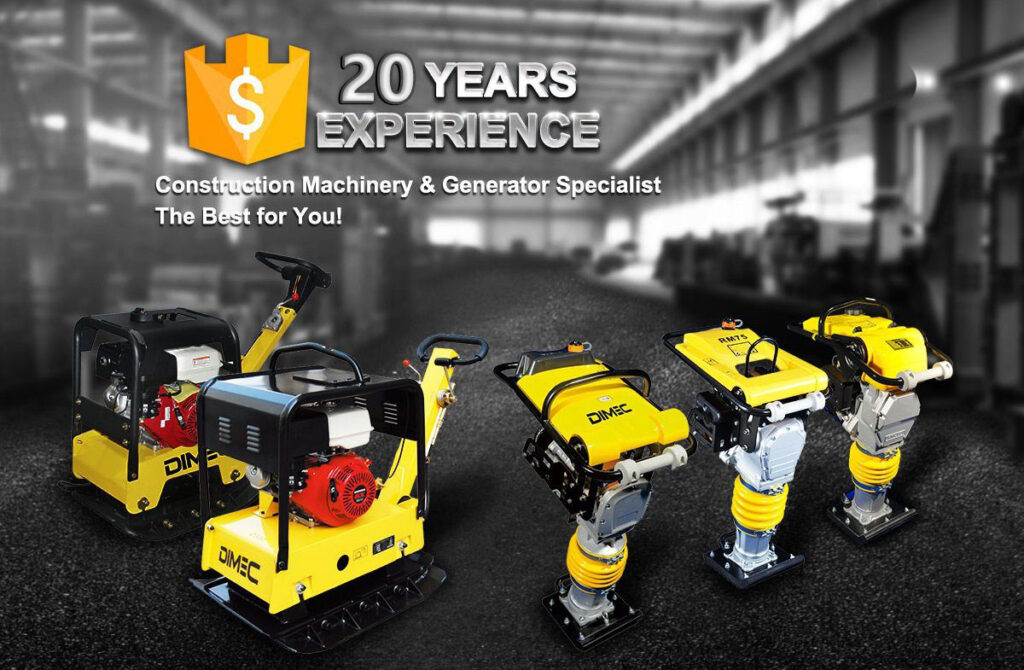
À propos de nous
Wuxi Pinnacle Mechanical Equipment Co, Ltd. (PME) En tant qu'entreprise spécialisée de premier ordre, nous servons des clients du monde entier. PME se spécialise dans la production de compacteurs à plaque, de pilonneuses, de scies à sol et de vibrateurs à béton pour l'industrie mondiale de la construction. Nous produisons également des moteurs, des générateurs et des pompes à eau. Les forces de PME proviennent de notre équipe solide et de nos ressources abondantes.
Nous disposons de lignes de production et d'assemblage complètes pour différentes machines. Une équipe d'ingénieurs en chef, de techniciens supérieurs et d'inspecteurs du contrôle qualité est équipée de divers équipements de finition, d'inspection des pièces détachées et de test des produits, afin de garantir la production et l'innovation. Ainsi, nous pouvons contrôler chaque étape de la production, de l'usinage de finition des pièces détachées à l'assemblage des produits, en passant par la découpe et le soudage des plaques d'acier et la pulvérisation de la peinture. Il en résulte un contrôle efficace de la qualité des produits.
Forte de plus de 20 ans d'expérience en matière d'exportation, PME exporte vers plus de 68 pays et régions, dont l'Amérique du Nord, l'Amérique du Sud, l'Europe, l'Asie du Sud-Est, le Moyen-Orient et l'Afrique. Nous formons également des sociétés stratégiques avec de nombreuses entreprises multinationales.
Salon de l'usine
Laissez notre expertise en matière de compacteurs à plaques sur mesure faire passer vos projets à la vitesse supérieure.
Pourquoi nous choisir ?
Fabricant professionnel de machines de construction avec service OEM
Nous sommes un fabricant de premier plan dans l'industrie des machines de construction, offrant des services de premier ordre en tant que fabricant d'équipement d'origine (OEM). Notre engagement en faveur de l'innovation et de l'ingénierie de précision garantit que nos machines répondent aux besoins spécifiques de nos clients, en fournissant des solutions personnalisées qui améliorent l'efficacité et la performance sur le chantier.
20 ans d'expérience en matière de production et d'exportation
Avec deux décennies d'expérience dans la production et l'exportation, nous nous sommes forgé une solide réputation en fournissant des équipements de construction fiables et de haute qualité dans le monde entier. Nos connaissances approfondies et notre expertise dans l'industrie nous permettent de comprendre les défis uniques des différents marchés, ce qui garantit que nos produits sont adaptés pour répondre aux normes mondiales.
Plus de 20 types d'équipements de chantier sont disponibles pour la sélection
Nous proposons une gamme diversifiée de plus de 20 types d'équipements de chantier, répondant aux différents besoins de l'industrie. Des machines lourdes aux outils spécialisés, notre gamme de produits est conçue pour soutenir chaque phase de la construction, offrant à nos clients la flexibilité de choisir l'équipement approprié pour leurs projets.
10 ans et plus de contrôle de la qualité des produits
Nos processus rigoureux de contrôle de la qualité ont été affinés pendant plus de 10 ans, garantissant que chaque pièce d'équipement que nous produisons répond aux normes les plus élevées. Notre équipe dédiée au contrôle de la qualité surveille méticuleusement chaque étape de la production, garantissant que nos produits offrent des performances et une durabilité constantes sur le terrain.
8+ ans d'expérience des travailleurs qualifiés
Notre équipe est composée de travailleurs hautement qualifiés ayant plus de 8 ans d'expérience dans l'industrie des machines de construction. Leur expertise et leur dévouement se reflètent dans la précision et le savoir-faire de nos produits, garantissant que chaque détail est exécuté à la perfection.
8 ateliers, 12 lignes de production
Avec 8 ateliers ultramodernes et 12 lignes de production, nos capacités de fabrication sont conçues pour répondre efficacement aux demandes à grande échelle. Nos installations de pointe nous permettent de maintenir un processus de production rationalisé, garantissant la livraison en temps voulu de machines de haute qualité à nos clients dans le monde entier.
Une efficacité supérieure dans la construction grâce à nos machines conçues par des experts
Découvrez un monde d'équipements de construction avancés conçus pour répondre aux exigences des chantiers modernes. Avec 20 ans d'expérience dans l'industrie et un engagement de qualité, nos machines sont conçues pour augmenter la productivité et assurer la fiabilité de chaque projet. Explorez notre gamme diversifiée et découvrez la différence des solutions conçues avec précision.




